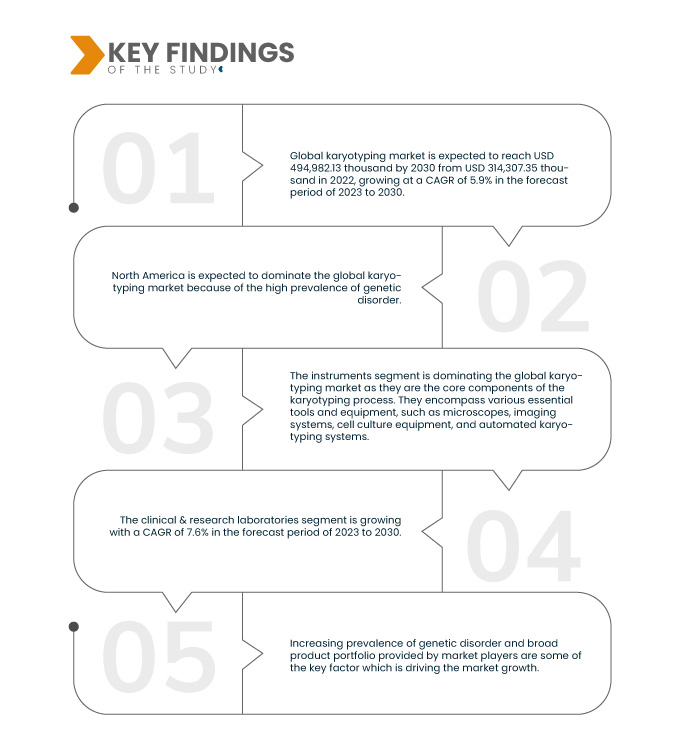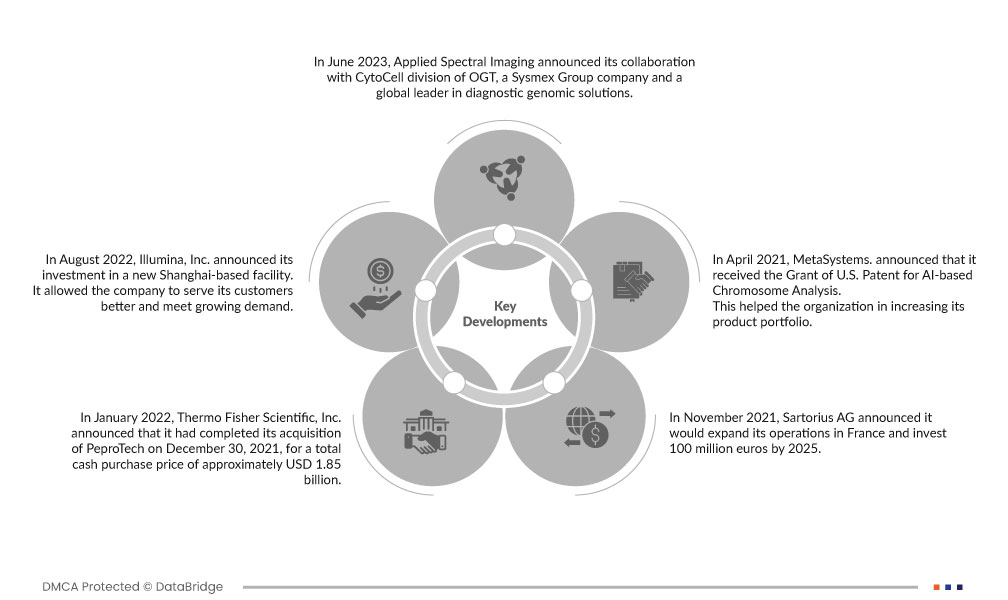Genetic disorders occur when a mutation affects the genes or chromosomes with the wrong amount of genetic material. Genetic disorders may cause severe health problems, such as cancer, infertility in men or women, down syndrome, and Turner syndrome. The karyotyping testing can be performed on a sample of blood, bone marrow, amniotic fluid, or placental tissue. In karyotyping, changes in chromosome number associated with aneuploid conditions, such as trisomy 21 (down syndrome), can be found. In April 2022, according to the genetics, chromosome abnormalities, aneuploidy is a general condition used for an abnormal number of chromosomes consisting of one or more extra or missing chromosomes. It is the most prevalent chromosome abnormality in humans (developing in 5 to 10% of all pregnancies) and is the leading genetic cause of miscarriage and congenital disabilities duplications or inversions can be revealed by careful analysis of karyotypes' more subtle structural changes, such as chromosomal deletions and translocations.
Access Full Report @ https://www.databridgemarketresearch.com/reports/global-karyotyping-market
Data Bridge Market Research analyzes that the Global Karyotyping Market is expected to reach USD 494,982.13 thousand by 2030, at a CAGR of 5.9% during the forecast period 2023-2030. Rising incidence rates of genetic disorders and high benefits, such as efficient and accurate detection, are some of the main factors that fuel demand for karyotyping tests that are expected to boost market growth.
Key Findings of the Study
Increasing Cases of Chromosomal Abnormalities and Adoption of Sequencing Testing is Expected to Drive the Market Growth
Genomics-focused pharmacology is playing a greater role in treating various chronic diseases. Karyotyping to identify chromosomal sequencing and patterns is evolving as a powerful tool for providing more precise findings into molecular underpinnings to identifying the disease.
Karyotyping can be used to detect a variety of genetic disorders. For instance, a woman with premature ovarian failure may have a chromosomal defect that can be found by karyotyping. The test is also useful for identifying the Philadelphia chromosome, as a result of which chromosome can signal chronic myelogenous leukemia (CML).
Karyotypes can reveal changes in chromosome number associated with aneuploid conditions, such as trisomy 21 (down syndrome). Careful analysis of karyotypes can also reveal more subtle structural changes, such as chromosomal deletions, duplications, translocations, or inversions.
Karyotyping reveals the size, shape, and number of chromosomes in a sample of cells. Clinical cytogeneticists analyze human karyotypes to detect gross genetic changes—anomalies involving several megabases or more of DNA, Thus, increasing adoption of genome-focused pharmacology for genetic disorders or chronic disease treatment is expected to drive the market growth.
Report Scope and Market Segmentation
|
Report Metric
|
Details
|
|
Forecast Period
|
2023 to 2030
|
|
Base Year
|
2022
|
|
Historic Years
|
2021 (Customizable to 2015 - 2020)
|
|
Quantitative Units
|
Revenue in USD Thousand
|
|
Segments Covered
|
Product (Instruments, Software & Services, and Consumables & Accessories), Type (Spectral Karyotyping and Virtual Karyotyping), Application (Diagnosis, Personalized Medicines, Research, and Others), End User (Clinical & Research Laboratories, Hospitals, Pathology Laboratories, Pharmaceutical & Biotechnology Companies, Academic Research Institutes, and Others), Distribution Channel (Direct Tender, Retail Sales, and Others)
|
|
Countries Covered
|
U.S., Canada, Mexico, Germany, France, U.K., Italy, Russia, Spain, Turkey, Belgium, Netherlands, Switzerland, Denmark, Norway, Sweden, Poland, Finland, Rest of Europe, China, Japan, India, South Korea, Australia, Singapore, Thailand, Indonesia, Philippines, Malaysia, Vietnam, New Zealand, Taiwan, Hong Kong, Rest of Asia-Pacific, Brazil, Argentina, Rest of South America, South Africa, Saudi Arabia, U.A.E., Egypt, Israel, Oman, Qatar, Bahrain, and Rest of Middle East and Africa
|
|
Market Players Covered
|
Thermo Fisher Scientific Inc. (U.S.), Bio-Rad Laboratories, Inc. (U.S.), Agilent Technologies, Inc. (U.S.), Abbott (U.S.), Applied Spectral Imaging (U.S.), Empire Genomics, Inc. (U.S.), PerkinElmer Inc. (U.S.), Leica Biosystems Nussloch GmbH (Germany), MetaSystems. (Germany), Sartorius AG (Germany), CytoTest Inc. (U.S.), SciGene Corporation (U.S.), West Medica Produktions- und Handels- GmbH (Austria), MICROPTIC (Spain), Laboratory Imaging s.r.o. (Czech Republic), Dewinter Optical Inc (India), BioDot (U.S.), Stemmera Inc. (U.S.), Capricorn Scientific (Germany), Creative Bioarray. (U.S.), and Illumina, Inc. (U.S.)
|
|
Data Points Covered in the Report
|
In addition to the insights on market scenarios such as market value, growth rate, segmentation, geographical coverage, and major players, the market reports curated by the Data Bridge Market Research also include depth expert analysis, patient epidemiology, pipeline analysis, pricing analysis, and regulatory framework.
|
Segment Analysis:
The global karyotyping market is segmented into five notable segments based on product, type, application, end user, and distribution channel.
- On the basis of product, the market is segmented into instruments, software & services, and consumables & accessories.
In 2023, the instruments segment is expected to dominate the global karyotyping market
In 2023, the instruments segment is expected to dominate the market with a market share of 63.19% as they are the core components of the karyotyping process. They encompass various essential tools and equipment, such as microscopes, imaging systems, cell culture equipment, and automated karyotyping systems.
- On the basis of type, the market is segmented into spectral karyotyping and virtual karyotyping.
In 2023, the spectral karyotyping segment is expected to dominate the global karyotyping market
In 2023, the spectral karyotyping segment is expected to dominate the market with a market share of 67.94% as it provides higher resolution and precision in identifying chromosomal abnormalities than conventional karyotyping techniques.
- On the basis of application, the market is segmented into diagnosis, personalized medicines, research, and others. In 2023, the diagnosis segment is expected to dominate the market with a market share of 42.15%.
- On the basis of end user, the market is segmented into clinical & research laboratories, hospitals, pathology laboratories, pharmaceutical & biotechnology companies, academic research institutes, and others. In 2023, the clinical & research laboratories segment is expected to dominate the market with a market share of 34.73%.
- On the basis of distribution channel, the market is segmented into direct tender, retail sales, and others. In 2023, the direct tender segment is expected to dominate the market with a market share of 66.80%.
Major Players
Data Bridge Market Research analyzes Thermo Fisher Scientific Inc. (U.S.), Illumina, Inc. (U.S.), Agilent Technologies, Inc. (U.S.), Sartorius AG (Germany), and Abbott (U.S.) as the major market players in the global karyotyping market.
Market Developments
- In June 2023, Applied Spectral Imaging announced its collaboration with CytoCell division of OGT, a Sysmex Group company and a global leader in diagnostic genomic solutions. This partnership will expand its global reach and add value to customers in cytogenetics laboratories.
- In August 2022, Illumina, Inc. announced its investment in a new Shanghai-based facility. It allowed the company to serve its customers better and meet growing demand.
- In January 2022, Thermo Fisher Scientific, Inc. announced that it had completed its acquisition of PeproTech on December 30, 2021, for a total cash purchase price of approximately USD 1.85 billion. This helped the organization increase its product portfolio and generate revenue.
- In November 2021, Sartorius AG announced it would expand its operations in France and invest 100 million euros by 2025. This helped the organization increase its production capacity and overall revenue generation.
- In April 2021, MetaSystems announced that it had received the Grant of U.S. Patent for AI based Chromosome Analysis. This helped the organization in increasing its product portfolio.
Regional Analysis
Geographically, the countries covered in the global karyotyping market report are U.S., Canada, Mexico, Germany, France, U.K., Italy, Russia, Spain, Turkey, Belgium, Netherlands, Switzerland, Denmark, Norway, Sweden, Poland, Finland, Rest of Europe, China, Japan, India, South Korea, Australia, Singapore, Thailand, Indonesia, Philippines, Malaysia, Vietnam, New Zealand, Taiwan, Hong Kong, Rest of Asia-Pacific, Brazil, Argentina, Rest of South America, South Africa, Saudi Arabia, U.A.E., Egypt, Israel, Oman, Qatar, Bahrain, and Rest of Middle East and Africa.
As per Data Bridge Market Research analysis:
North America is expected to dominate the global karyotyping market
North America is expected to dominate the market due to the higher level of investments by various manufacturers, increasing demand for products manufacturing, and the rising awareness about karyotyping testing among the population in the region.
Asia-Pacific is the fastest-growing region in the global karyotyping market
Asia-Pacific is expected to be the fastest growing region in the market due to the rising technological advancements and strategic initiatives by the major market players.
For more detailed information about the global karyotyping market report, click here – https://www.databridgemarketresearch.com/reports/global-karyotyping-market












